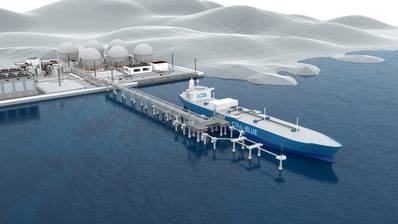Mitsubishi Shipbuilding, NYK collaborate to create Large Liquefied CO2 Carrier
With all eyes on carbon neutrality, a pair of Japanese maritime titans -- Mitsubishi Shipbuilding and Nippon Yusen Kabushiki Kaisha (NYK Line) -- have agreed to jointly develop a large-scale liquefied CO2 (LCO2) carrier.
To facilitate the development of technologies for transporting CO2 using large vessels, this project will combine Mitsubishi Shipbuilding’s gas handling technologies with NYK Line’s knowledge in operations of not only small and medium-sized vessels, but also large vessels that are expected to increase in demand globally.
Mitsubishi Shipbuilding is actively pursuing commercialization of LCO2 carriers as part of MHI Group’s strategic initiative for the energy transition, bringing together technologies and knowledge gained from construction of liquified gas carriers in an effort, as a marine systems integrator, to support decarbonization at sea. This joint project is expected to make a significant contribution to the establishment of a CO2 ecosystem(Note) in the CO2 transport sector, which will be an essential component of the CCUS value chain.
NYK Line expects the establishment of technology to transport CO2 using large-scale LCO2 carriers to make a significant contribution to the realization of a carbon neutral world. Through this joint project with MHI Group, which possesses a wide range of technologies to overcome the high technological hurdles in the CCUS value chain, NYK Line will be integrating its accumulated wealth of knowledge in ship operations to support early realization of not only small and medium sized vessels, but also large-scale LCO2 carriers. Building on this project, NYK Line will participate in the CCUS value chain.

